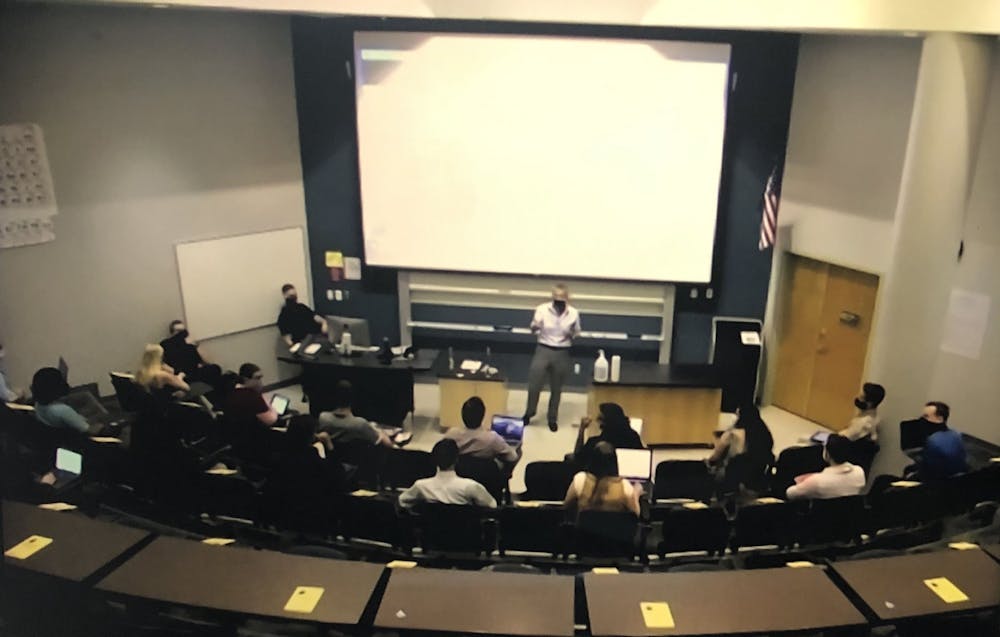Thomas Seager, the associate professor of engineering business practices who made news last semester for violating University COVID-19 policy by telling students in his in-person class to sit closer together, has continually posted conspiracies about the coronavirus on his personal Twitter account and recently insulted a UA epidemiology professor.
READ MORE: Professor claiming COVID-19 is not a 'real pandemic' asks students to move closer together
“Unless designated by the university to speak on behalf of ASU, the opinions and views expressed by ASU faculty, staff or affiliates on social media, or other public channels, are strictly personal and do not represent the university," Katie Paquet, a University spokesperson, wrote in a statement.
Paquet added the University “encourages everyone to confirm the validity of COVID-19 information found online with proper sources,” and “In his capacity as an employee of the university, Mr. Seager will be required to follow the public health protocols of ASU when he is on campus.”
The encouragement by the University for people to validate COVID-19 information, nor backlash for his actions in the classroom during the fall semester, has not changed Seager's discourse on Twitter.
In an exchange on Jan. 2 on Twitter, Elizabeth Jacobs, a professor of epidemiology and biostatistics in the Mel and Enid Zuckerman College of Public Health at UA, responded to a group of individuals who did not believe the COVID-19 pandemic was real. Seager joined the exchange, writing that Jacobs did not cite data and relied on “emotion and GenX pop cultural memes” to make her point.
In separate tweets, Seager asked how she managed her anger and then likened her response to having a mental disorder.
Jacobs wrote in an email that responses like this are expected in her line of work now, but “when I discovered that he was a professor, I was taken aback. When I saw that he was a professor at ASU, I was horrified.”
“Comments like Seager's imply that mental illness is something about which one should be ashamed, and it's absolutely not,” she wrote. “I worry, especially during these challenging times, the effect this could have on students who are understandably suffering right now. His views on COVID-19 are self-explanatorily harmful to the university community.”
Seager did not respond to a request for comment. Paquet did not respond to an email asking how the University could be sure Seager would not violate ASU's COVID-19 guidelines again.
Since the start of the pandemic, Seager has posed multiple conspiracies on Twitter that have been debunked by fact-checkers and other articles, including claiming the COVID-19 pandemic is not real and stating hospitals are using the pandemic to receive money from the federal government.
Despite the University being on winter break, active COVID-19 infections have risen within the ASU community. An update Monday reported 562 active infections among students and employees, a 47-case increase from the previous update last Thursday.
Jacobs wrote she did not expect any action from ASU, as Seager has the right to say what he wants on social media.
She wrote the statements of misinformation during the pandemic made by Seager and many others “has fed into a poor understanding of the real risks” COVID-19 presents and has contributed to Arizona having the highest average daily case rate per 100,000 people in the last seven days across the U.S., according to data from the Centers for Disease Control and Prevention.
Jacobs added that if the coronavirus is not taken seriously now, “I don't know when it will be."
“Without mitigation, the worst is yet to come,” Jacobs said.
Editor's Note: Due to an editing error, the story has been updated on Jan. 8 at 10:16 a.m. to remove the title of Elizabeth Jacobs, according to AP Style.
Reach the reporter at wmyskow@asu.edu and follow @wmyskow on Twitter.
Like The State Press on Facebook and follow @statepress on Twitter.
Continue supporting student journalism and donate to The State Press today.

Wyatt Myskow is the project manager at The State Press, where he oversees enterprise stories for the publication. He also works at The Arizona Republic, where he covers the cities of Peoria and Surprise.




